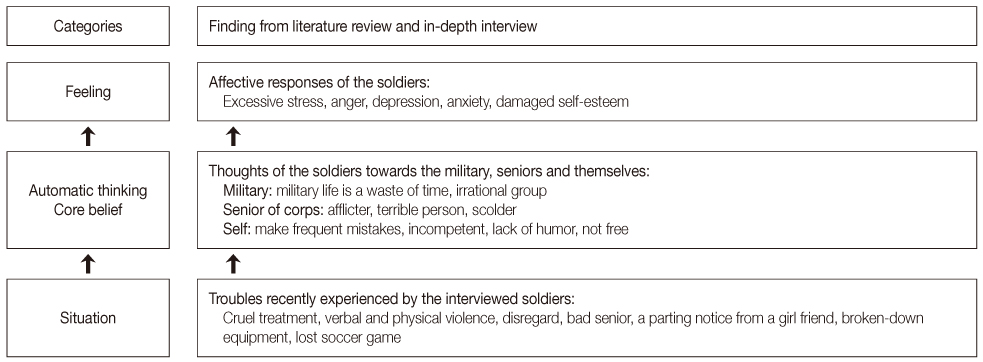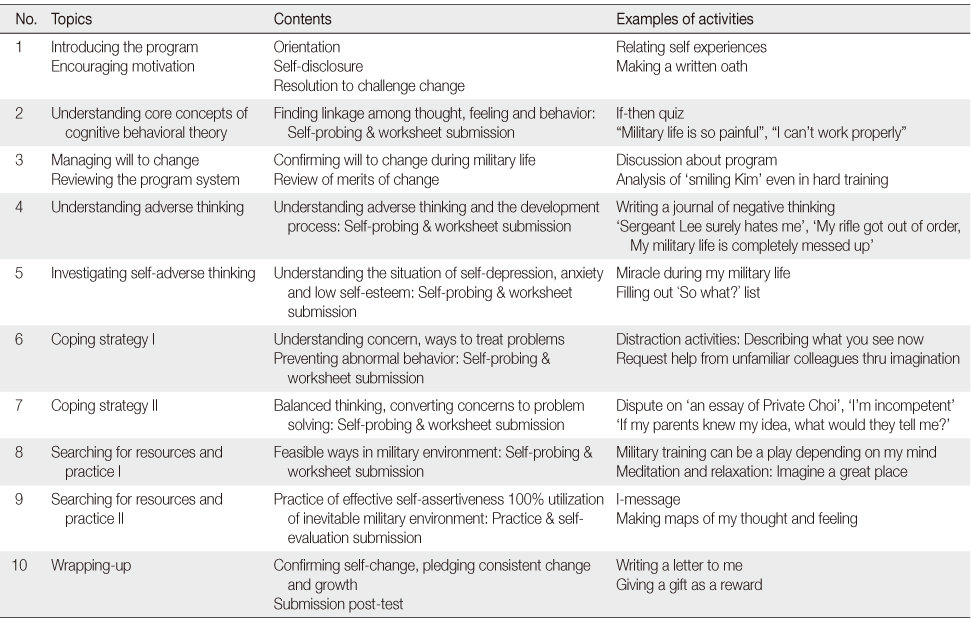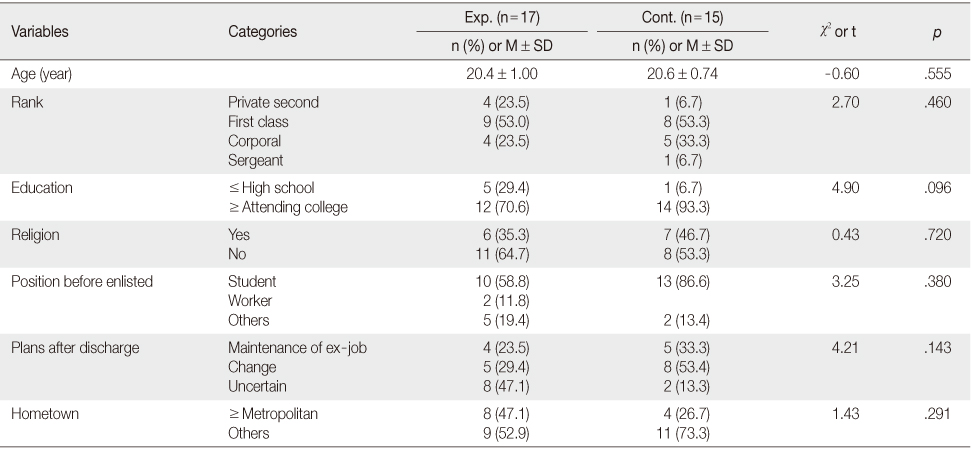Articles
- Page Path
- HOME > J Korean Acad Nurs > Volume 44(6); 2014 > Article
-
Original Article
- Effectiveness of the Military Mental Health Promotion Program
- Chung Hee Woo, Sun Ah Kim
-
Journal of Korean Academy of Nursing 2014;44(6):717-725.
DOI: https://doi.org/10.4040/jkan.2014.44.6.717
Published online: December 31, 2014
1College of Nursing, Konyang University, Daejeon, Korea.
2College of Nursing, Yonsei University, Seoul, Korea.
- Address reprint requests to: Kim, Sun Ah. College of Nursing, Yonsei University, 50 Yonsei-ro, Seodaemun-gu, Seoul 120-752, Korea. Tel: +82-10-7112-1277, Fax: +82-2-392-5540, psy0962@yuhs.ac
© 2014 Korean Society of Nursing Science
This is an Open Access article distributed under the terms of the Creative Commons Attribution NoDerivs License. (http://creativecommons.org/licenses/by-nd/4.0/) If the original work is properly cited and retained without any modification or reproduction, it can be used and re-distributed in any format and medium.
- 869 Views
- 6 Download
- 1 Crossref
Abstract
-
Purpose
- This study was done to evaluate the Military Mental Health Promotion Program. The program was an email based cognitive behavioral intervention.
-
Methods
- The research design was a quasi-experimental study with a non-equivalent control group pretest-posttest design. Participants were 32 soldiers who agreed to participate in the program. Data were collected at three different times from January 2012 to March 2012; pre-test, post-test, and a one-month follow-up test. The data were statistically analyzed using SPSS 18.0. The effectiveness of the program was tested by repeated measures ANOVA.
-
Results
- The first hypothesis that the level of depression in the experimental group who participated in the program would decrease compared to the control group was not supported in that the difference in group-time interaction was not statistically significant (F=2.19, p=.121). The second and third hypothesis related to anxiety and self-esteem were supported in group-time interaction, respectively (F=7.41, p=.001, F=11.67, p<.001).
-
Conclusion
- Results indicate that the program is effective in improving soldiers' mental health status in areas of anxiety and self-esteem.
- 1. Jung HS, Song EJ. The effects of a group counseling program for the military in mental health, self-esteem, and quality of life. J Korean Acad Psychiatr Ment Health Nurs. 2008;17(4):353–362.ArticlePDF
- 2. Kim S, Kim HL, Woo C, Park S, Keum R. Communication abilities, interpersonal relationship, anxiety, and depression in Korean soldiers. J Korean Acad Psychiatr Ment Health Nurs. 2011;20(1):81–90.Article
- 3. Koo SS. A study on mental health of new generation soldiers. Ment Health Soc Work. 2006;24:64–93.
- 4. Jeong MK, Ko KS. The effect of soldiers' self-esteem and depression on suicidal ideation: Verifying mediation effect of depression. Korean J Soc Welf Stud. 2009;40(4):453–483.Article
- 5. Kim HJ, Son CN. The effects of cognitive behavioral therapy on anxiety and depression of evaluative concerns perfectionistic undergraduate students. Korean J Clin Psychol. 2007;26(4):805–826.Article
- 6. Hyun MS, Nam KA, Kang HS. The effects of cognitive behavioral anger management program on self-consciousness and anger in Korean military man. J Korean Acad Nurs. 2006;36(6):1076–1084.ArticlePDF
- 7. Yi YM. A single case experimental study on the effects of cognitive-behavioral treatment for depression: Armed Forces nursing academy cadets [master's thesis]. Seoul, Yonsei University. 1997.
- 8. Hyun JH, Kim HG. The effect of anger management program for adjustment of soldiers. Ment Health Soc Work. 2007;27:5–27.
- 9. Finkelstein J, Lapshin O. Reducing depression stigma using a web-based program. Int J Med Inform. 2007;76(10):726–734. http://dx.doi.org/10.1016/j.ijmedinf.2006.07.004ArticlePubMed
- 10. Griffiths KM, Christensen H, Jorm AF, Evans K, Groves C. Effect of web-based depression literacy and cognitive-behavioural therapy interventions on stigmatising attitudes to depression: Randomised controlled trial. Br J Psychiatry. 2004;185:342–349. http://dx.doi.org/10.1192/bjp.185.4.342ArticlePubMed
- 11. Griffiths KM, Crisp D, Christensen H, Mackinnon AJ, Bennett K. The ANU WellBeing study: A protocol for a quasi-factorial randomised controlled trial of the effectiveness of an Internet support group and an automated Internet intervention for depression. BMC Psychiatry. 2010;10:20. http://dx.doi.org/10.1186/1471-244x-10-20ArticlePubMedPMCPDF
- 12. Woo CH, Kim SA, Jang JS. The influence of characteristics of intranet usage and interpersonal relation disposition on mental health among air force soldiers. J Mil Nurs Res. 2011;29(1):110–123.
- 13. Radloff LS. The CES-D scale: A self-report depression scale for research in the general population. Appl Psychol Meas. 1977;1(3):385–401.
- 14. Cho MJ, Kim KH. Diagnostic validity of the CES-D (Korean version) in the assessment of DSM-III-R major depression. J Korean Neuropsychiatr Assoc. 1993;32(3):381–399.
- 15. Spielberger CD, Gorsuch RL, Lushene RE. Manual for the state-trait anxiety inventory. Palo Alto, CA: Consulting Psychologists Press; 1970.
- 16. Kim CT. The relationship between trait-anxiety and sociality: Focusing on the Spielberger's STAI [master's thesis]. Seoul, Korea University. 1978.
- 17. Rosenberg M. Society and the adolescent self-image. Princeton, NJ: Princeton University Press; 1965.
- 18. Jon BJ. A study on the possibility of self-concept measures. Yonsei Nonchong. 1974;11:107–129.
- 19. Cohn A, Pakenham K. Efficacy of a cognitive-behavioral program to improve psychological adjustment among soldiers in recruit training. Mil Med. 2008;173(12):1151–1157.ArticlePubMed
- 20. Tyne and Wear NHS Trust. Depression and low mood: A self help guide [Internet]. Northumberland, UK, Author. 2010;cited 2011 November 15. Available from: http://www.ntw.nhs.uk/pic/selfhelp/
- 21. The Australian National University. MoodGym: An introductory self-help course in cognitive behaviour therapy [Internet]. Canberra, AU, Author. 2009;cited 2011 November 15. Available from: http://www.moodgym.anu.edu.au
- 22. Kim SC. Effects of development and application of cognitive and behavioral self-esteem enhancement program: Led by maladjustment soldiers [master's thesis]. Incheon, Inha University. 2008.
- 23. Smith JM. Adolescent males' view on the use of mental health counseling services. Adolescence. 2004;39(153):77–82.PubMed
- 24. Williams A, Hagerty BM, Brasington SJ, Clem JB, Williams DA. Stress gym: Feasibility of deploying a web-enhanced behavioral self-management program for stress in a military setting. Mil Med. 2010;175(7):487–493.ArticlePubMed
- 25. Ström L, Pettersson R, Andersson G. Internet-based treatment for insomnia: A controlled evaluation. J Consult Clin Psychol. 2004;72(1):113–120. http://dx.doi.org/10.1037/0022-006x.72.1.113ArticlePubMed
- 26. Vernmark K, Lenndin J, Bjärehed J, Carlsson M, Karlsson J, Oberg J, et al. Internet administered guided self-help versus individualized e-mail therapy: A randomized trial of two versions of CBT for major depression. Behav Res Ther. 2010;48(5):368–376. http://dx.doi.org/10.1016/j.brat.2010.01.005ArticlePubMed
- 27. Zetterqvist K, Maanmies J, Ström L, Andersson G. Randomized controlled trial of internet-based stress management. Cogn Behav Ther. 2003;32(3):151–160. http://dx.doi.org/10.1080/16506070302316ArticlePubMed
- 28. Andersson G, Carlbring P, Berger T, Almlöv J, Cuijpers P. What makes internet therapy work. Cogn Behav Ther. 2009;38:Suppl 1. 55–60. http://dx.doi.org/10.1080/16506070902916400ArticlePubMed
- 29. Hyun MS, Chung HI, Kang HS. Influencing factors on military adaptation among Korean soldiers. J Korean Acad Psychiatr Ment Health Nurs. 2009;18(3):305–312.ArticlePDF
- 30. Smith TC, Zamorski M, Smith B, Riddle JR, Leardmann CA, Wells TS, et al. The physical and mental health of a large military cohort: Baseline functional health status of the millennium cohort. BMC Public Health. 2007;7:340. http://dx.doi.org/10.1186/1471-2458-7-340ArticlePubMedPMC
REFERENCES
Figure & Data
REFERENCES
Citations

- The Analysis of Factors Influencing the Intention to Use of Military Telemental Health Services Among Psychiatric Outpatients at Military Hospital
Juyeon Kang, Soyeon Park, Kyungmi Woo
Telemedicine and e-Health.2026;[Epub] CrossRef

Figure 1
Overview of the Military Mental Health Promotion Program
Homogeneity of General Characteristics (N=32)
Exp.=Experimental group; Cont.=Control group.
Homogeneity of Dependent Variables (N=32)
Exp.=Experimental group; Cont.=Control group.
Effectiveness of Military Mental Health Promotion Program (N=32)
Exp.=Experimental group; Cont.=Control group.
Exp.=Experimental group; Cont.=Control group.
Exp.=Experimental group; Cont.=Control group.
Exp.=Experimental group; Cont.=Control group.
 KSNS
KSNS
 E-SUBMISSION
E-SUBMISSION





 Cite
Cite

